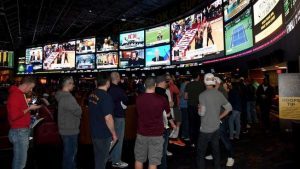In June, the General Assembly of Illinois passed a bill that legalized sports gambling, sanctioned six new casinos in the state, increased the number of video gambling machines, and brought casino operations to horse racing tracks across the state. These changes, when implemented, will make the state of Illinois one of the leading gambling destinations in the Midwest. According to ProPublica Illinois, the new bill would leave the state with nearly 80,000 gambling positions, which is more than double what the state had previously and nearly four times the number of positions in any neighboring state.
Prior to the passing of the bill, Illinois was home to 10 casinos. The addition of six new casinos, including what is being referred to as “mega-casino” in Chicago, is certainly a significant increase that will change the gaming landscape of the state in the coming years. There is no time-table for the conclusion of the construction the Chicago casino, but policy makers have estimated that the casino could be up and running in two to three years. In addition to the mega-casino in Chicago, the Illinois Gaming Board (IGB) has issued a license for new casinos in Danville, Waukegan and Rockford, Williamson County, and one for Cook County. The license for Cook County will be issued in one of the suburban townships: Bloom, Bremen, Calumet, Rich, Thornton, or Worth.
In addition to the brick and mortar casino expansion, the new bill could bring more than 7,000 video gaming, establishments, 5,000 lottery-based sports betting kiosks, as well as access to online sports gambling through mobile devices within the next two years. Under the current plan, online sports betting platforms like DraftKings and FanDuel would be barred from entering the market for the first 18 months, in order to give casinos priority. Aside from the sports betting opportunities, the bill also allows the establishment of video and slot poker machines at the O’Hare and Midway airports, located in Chicago.
Expected Returns from Extensive Expansion
The large gambling expansion is expected to bring in a substantial amount of revenue for the state. IllinoisPolicy.org projects the casino expansion could bring in $360 million from one-time license, application, and position fees in the fiscal year for 2020. After the expansion is completed, it is estimated that the recurring annual revenue would total nearly $470 million. Given the size of the expansion, it’s tough to say how accurate these estimates could be, especially given the fact that projections for past gaming expansions have proven to be overly optimistic.
During the recession in 2009, law makers made a similar move as they passed the Video Gaming Act in hopes of generating revenue to help support the state’s building program. The gambling expansion was expected to generate $300 million a year, but instead the state was forced to borrow hundreds of millions of dollars to support its programs. The passing of the act was unable to fund the building program, which eventually tallied more than $10 billion in debt. Some law makers and residents fear that the new gambling and casino expansion could lead to similar issues.
Regulations for Addressing Concerns
In an attempt to counteract some of these concerns, the IGB announced last week that it will be adopting new rules in order to maintain an ethical approach to the casino license selection process. The objective of these rules, as reported by the Daily Herald, is to allow for transparency in the issuing of licenses for the new casinos. The rules would require those applying for licenses to disclose any potential or actual violations in order to ensure that the newly erected gaming facilities will be operating under state law.
The new rules for this disclosure agreement were enacted under the IGB’s emergency rulemaking authority. The emergency rulemaking authority gives the IGB to make new gaming rules without following the typical lengthy process of public notice and hearings. However, the rule can only be instated for a maximum of 150 days before having to go through the regular process to make the rule permanent. For the time being, the rule acts as a safeguard against the construction of casinos and other gaming sites that could lead to a loss of revenue for the state. As the large expansion continues to develop, IGB will have to revisit the existing rules to ensure that their plans do not mirror the mistakes of previous gaming expansions.